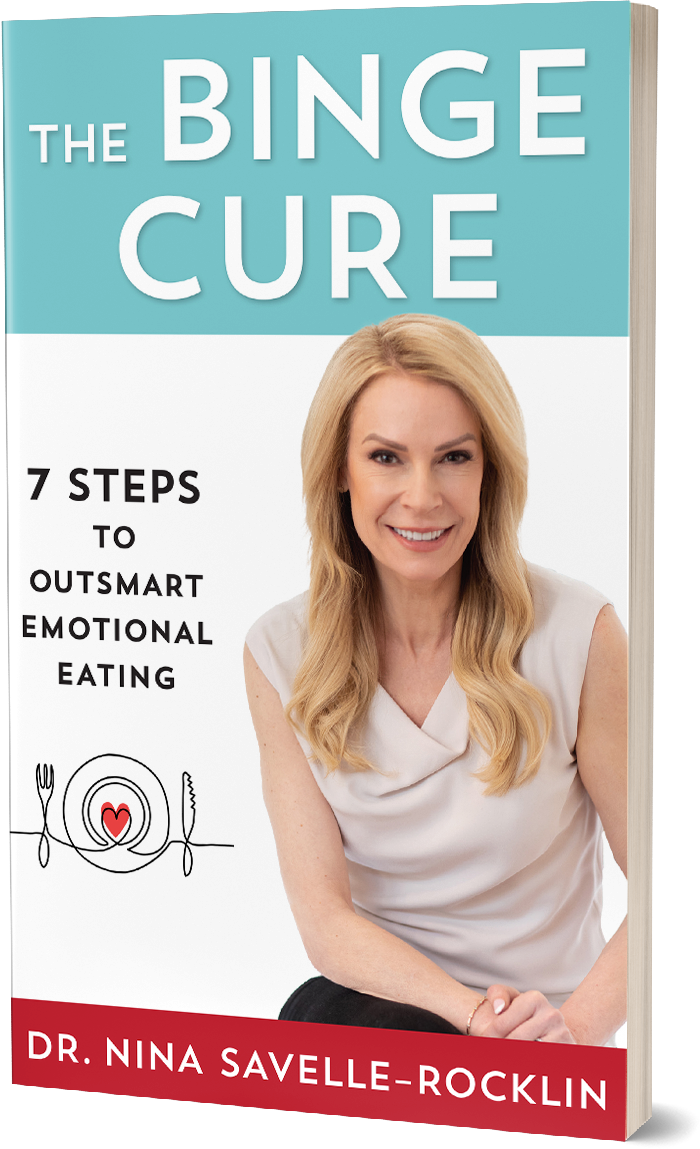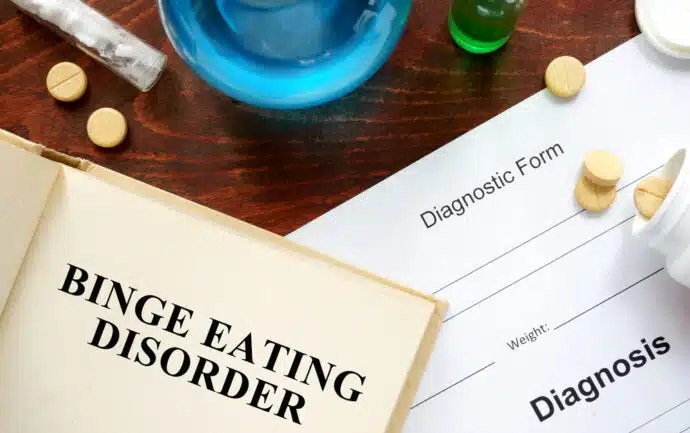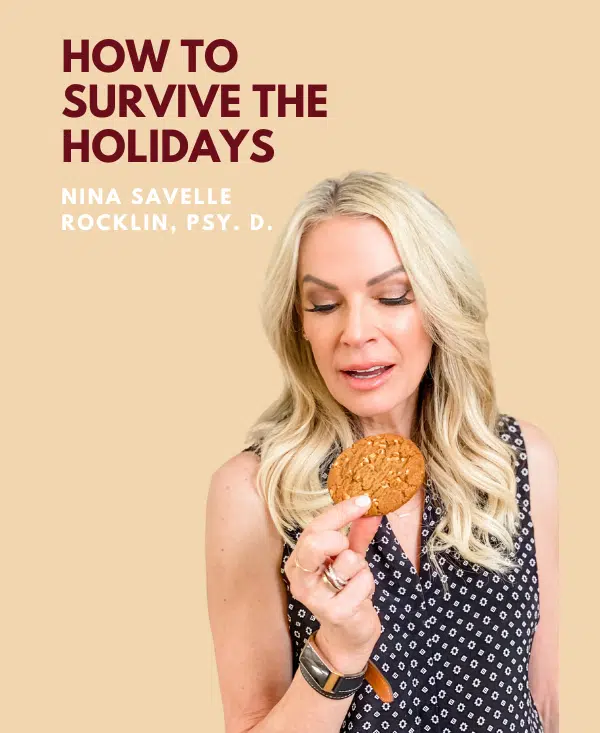Dr. Nina Savelle-Rocklin
The Shy Person’s Guide to Overcoming Binge Eating and Embracing Confidence
Table of Contents
- Understanding Shyness and Self-Consciousness
- What causes shyness?
- 7 Strategies to Stop Shyness
- Other strategies to overcome shyness
- Is shyness really a bad thing?
- Embracing Self-Confidence and Reframing Shyness
Ever feel self-conscious eating in public? Maybe you think people are judging your food choices or your weight. Or you dread walking into a room filled with strangers because it feels as if there’s a spotlight on you. Maybe you get home from a night out and go straight to the kitchen. If so, you’re not alone. There is definitely a connection between shyness, self-consciousness, and binge eating disorder.

Feeling self-conscious about our bodies, appearance, or basic selves, affects how we think other people see us. When we don’t feel good about ourselves, it’s easy to imagine that others are thinking the same negative thoughts about us. We may avoid social situations and stay home with food to keep us company.
Shyness is one of the most common personality traits in the world, and it can be crippling. Shy people often have a hard time making friends, dating, and networking. They may feel like they’re not good enough or that they don’t deserve success.
Shyness and binge eating are often correlated. People who struggle with shyness can develop binge eating as a coping mechanism to deal with their feelings of insecurity, anxiety, and low self-esteem. Binge eating can be a way of disconnecting from the world and finding comfort in food.
When someone feels shy or self-conscious, they might struggle with social situations and struggle to express themselves. As a result, they might turn to food to cope with these uncomfortable feelings.
People can be intimidating or scary. They can be unpredictable, unreliable, and unavailable. Yet food is always predictable, reliable, and available. Maybe you’ve experienced hurt or betrayal in a past relationship or are simply anxious around new people. Whatever the reason, the unpredictability and unreliability of human interactions can be stressful and overwhelming.
Food, on the other hand, is always there for us. It’s predictable – we know what it tastes like and we know where to find it. It’s reliable – we may not be able to count on people, but we can count on food. It won’t lie to us or betray us. And it’s available – unlike people, food is always within reach.
This reliability and availability can make food an appealing coping mechanism for those struggling with emotional eating or binge eating disorder. Food can provide a sense of control and comfort when people and relationships are unpredictable. Of course, bingeing also hurts our self-esteem and compromises our health.
The relationship between shyness and binge eating is complex. People who are more socially anxious may be more likely to engage in emotional eating because they lack other coping mechanisms or forms of self-soothing. They may use food to avoid social situations altogether or numbing out their emotions. Binge eating disorder is a reliable escape, providing temporary relief from the stress and pain of being shy or self-conscious.
On the other hand, it’s possible that people who already suffer from disordered eating can become even more withdrawn and socially isolated due to fear of judgment or criticism. This could then increase their risk for further binge episodes, creating a vicious cycle of isolation and binge eating.
But the good news is that we have the power to change. By building a positive view of ourselves and recognizing our worth, we can start feeling more confident and less self-conscious.
Understanding Shyness and Self-Consciousness
The words shyness and self-consciousness are often used interchangeably, yet they are different. Psychologist Bernardo J. Carducci, PhD, director of the Shyness Research Institute at Indiana University, defines shyness as “the presence of anxious reactions and excessive self-consciousness and negative self-evaluation in response to real or imagined social interactions.”
Self-consciousness is the state of judging yourself for how you look or even who you are, and it shows up in the presence of other people. Dr. Carducci notes that it can be one aspect of shyness.
Self-consciousness refers to a heightened awareness of ourselves, particularly in relation to others. Self-conscious people may be overly concerned about how they are perceived by others, and worry about their appearance, behavior, or actions.
Shyness is related to social situations and interactions with others, while self-consciousness is more about our own internal thoughts and feelings. While shyness is often seen as a personality trait, self-consciousness can be situational and may vary depending on the context or circumstances.
Shyness and self-consciousness are two related but distinct concepts. Essentially, shyness refers to a feeling of discomfort or awkwardness in social situations, especially when meeting new people or in situations where we are (or feel like) the center of attention. Shy people may feel hesitant or insecure about talking with others.
What causes shyness?
What causes shyness and self-consciousness? There’s no one-size-fits-all answer, as various factors can contribute to these feelings. First, genetics can play a role. Some people might be naturally predisposed to being shy or self-conscious due to their genetic makeup, which is their basic temperament. Just as some people are more introverted while others are extroverted, some are shyer than others.
Next, our upbringing and family environment can also have an impact. For those who grow up in a household where their parents are overly critical or emotional expression is discouraged, they often tend to see the world as critical and judgmental. Being hypervigilant and shy is a way of protecting themselves from a potentially scary world.
Last, cultural and societal factors can also contribute. Certain cultures might place more emphasis on modesty or humility, which could lead some people to be more self-conscious or shy in social situations. As you can see, there are many potential causes and contributing factors, and it’s often a combination of these elements that shape a person’s feelings of shyness and self-consciousness.
7 Strategies to Stop Shyness
One technique that can help is to shift our focus from feeling observed to being an observer. When we’re paying attention to what we see and think, we’re less likely to feel like we’re constantly under a microscope.
I once worked with a singer with such severe stage fright that she wouldn’t go on tour. She was convinced that the audience judged her weight and voice and she was certain she didn’t meet their expectations. She had a lot of shame and negative self-talk about her body, which she projected onto the audience.
Everything changed after she cultivated more self-acceptance and self-compassion. She became kinder to herself and more accepting and eventually felt confident enough to go back on tour. And when she went back on tour, she had a great experience. She could feel the audience’s energy and knew they were connecting with her.
At first, she imagined new people were coming to her shows. She soon realized that the audience had not changed. Instead of projecting her judgment into the audience and back at her, she imagined they were now as accepting of her as she was of herself.
Becoming an observer is a great technique to help reduce feelings of self-consciousness and improve our overall sense of well-being. When we practice keeping our gaze on the world instead of constantly worrying about how we are being perceived by others, we can experience a greater sense of freedom and ease.
When we focus our attention outward on what we think of other people and situations rather than on what others potentially think of us, we stop feeling scrutinized and under observation. This shift in focus helps reduce feelings of anxiety and self-doubt and can make it easier to engage in social situations without feeling overly self-conscious.
When we’re less self-conscious, we’re also less likely to turn to food as a coping mechanism. Those who struggle with binge eating or emotional eating use food to soothe their feelings of stress or anxiety. By becoming more of an observer and less focused on dodging criticism, we feel more comfortable and stop using food for comfort and distraction.
Of course, becoming an observer is not always easy, and it can take practice to cultivate this mindset. But with time and effort, it can become a powerful tool for reducing self-consciousness and improving our overall sense of well-being.
Other strategies to overcome shyness
1) Accept yourself for who you are. Don’t try to change who you are – that will only make you more anxious and shy. Just accept yourself as you are, warts and all.
2) Challenge your negative thoughts about yourself. If you catch yourself thinking, “I’m not good enough,” challenge that thought! Replace it with a more realistic thought like “I am perfectly imperfect, capable of doing this task/meeting new people.”
3) Practice socializing in safe environments first. Don’t jump into big social situations headfirst – start off by practicing in smaller groups
4) Notice your body language. People often don’t realize how much their body language affects how they come across to others. Drooping shoulders, avoiding eye contact, and speaking at a low volume all give off an air of timidity. Instead, try to stand up straight with your chin held high, maintain eye contact when appropriate, and speak in a clear voice.
5) Take small risks in social situations. Start small by approaching a stranger and introducing yourself or asking them a question about something you have in common. As you build confidence, gradually increase the size of the risk until you’re able to handle larger social situations comfortably.
6) Find activities that help you relax. Whether it’s yoga, reading, or binge-watching a show, find a way to relax during times of stress. This helps you relax and reduce the severity of your shyness in difficult social situations.
Is shyness really a bad thing?
While shyness is often seen as a negative quality, there are actually several reasons why it can be a good thing.
- Shy people are often wonderful listeners because they prefer to observe and take in their surroundings before speaking up. This can make them great confidants and supportive friends.
- Shy people are often thoughtful and reflective: Because they tend to reflect before speaking, they may be more introspective and self-aware. This can lead to greater personal growth and a deeper understanding of themselves and others.
- Shy people are often more empathetic, sensitive to the feelings of others, which can make them more empathetic and compassionate. This can lead to stronger relationships and a greater ability to connect with others emotionally.
- Shy people often have unique perspectives on the world: Because they are more inclined to think before speaking, they can sometimes come up with creative solutions or approaches that others may not have considered. This can be a great asset in the workplace or other collaborative projects.
- Shy people can be more creative: Shyness can lead to a more inward-focused perspective, which can facilitate creativity and imagination. Some studies show that shyness is correlated with increased creativity in certain artistic areas.
So while shyness is often seen as a negative trait by those who feel shy, it’s important to recognize that it can also have many positive aspects. If you’re shy, remember that you have unique perspectives and strengths, so celebrate yourself for that.
Embracing Self-Confidence and Reframing Shyness
Embracing self-confidence can be a challenging process. Still, there are several things you can do to help build your self-esteem and feel more comfortable in social situations.
One strategy is to focus on your strengths and accomplishments. Make a list of your personal and professional achievements, and remind yourself of them often. This can help boost your confidence and provide a sense of pride in yourself.
It can be helpful to start small when it comes to overcoming shyness. Practice initiating conversations with people you feel comfortable around, such as family or close friends. Gradually work your way up to more challenging social situations, such as networking events or parties.
It can also be helpful to reframe your thoughts about social situations. Instead of focusing on the potential for rejection or embarrassment, try to view them as opportunities for growth and connection. Remember that everyone feels nervous or awkward at times.
References:
Carducci, B. J. (2017, June 1). Psychology in Action: Everything you ever wanted to know about shyness in an international context. Psychology International. https://www.apa.org/international/pi/2017/06/shyness
Ready to transform your relationship with food?
Join Dr. Nina's newsletter and receive:
• Expert tips on overcoming emotional eating
• Strategies for sustainable weight loss
• Exclusive content not found anywhere else
Don't miss out on the latest breakthroughs in binge eating!
The Author

Dr. Nina Savelle-Rocklin is a renowned author and podcast host and one of the nation’s leading psychoanalysts known for the psychology of eating. Her signature message of, “It’s not what you’re eating, it’s what’s eating ‘at’ you” has resonated with hundreds of thousands of listeners from around the globe in 40 countries. As founder of The Binge Cure Method, she guides emotional eaters to create lasting food freedom so they can take back control of their lives and feel good in their bodies.
Related Blogs
















